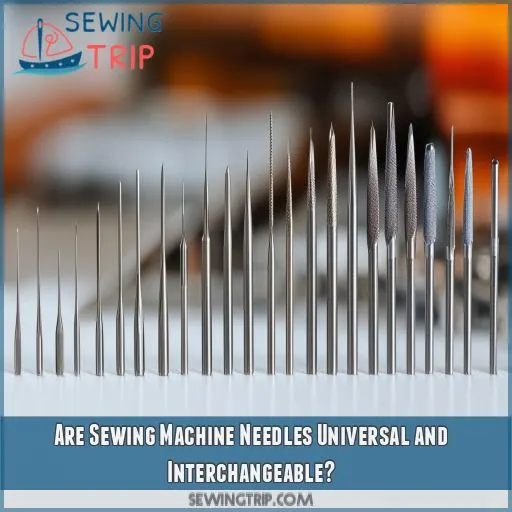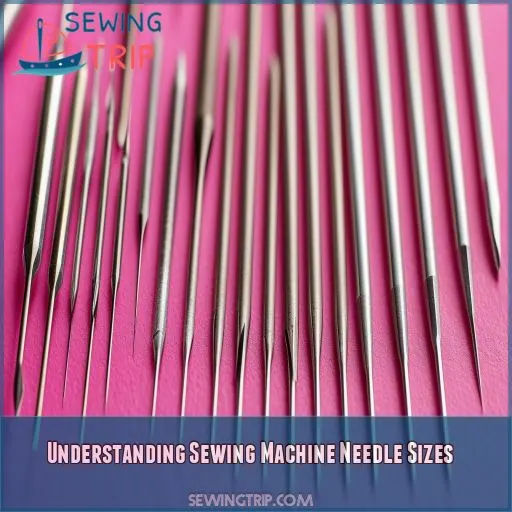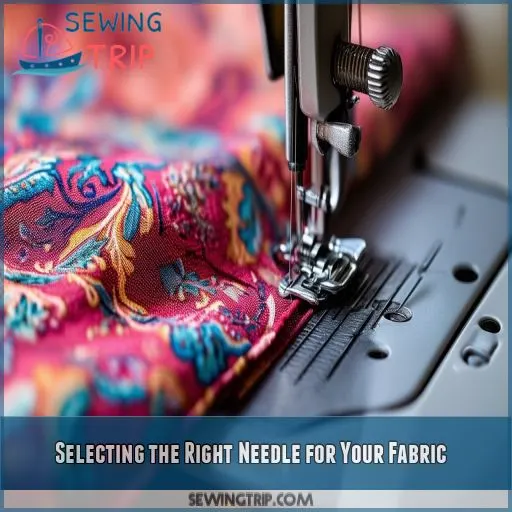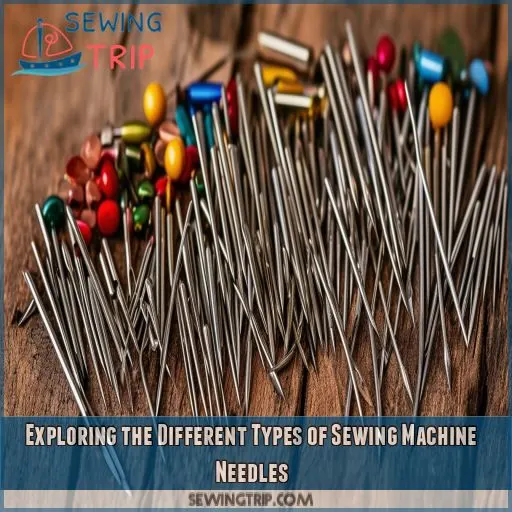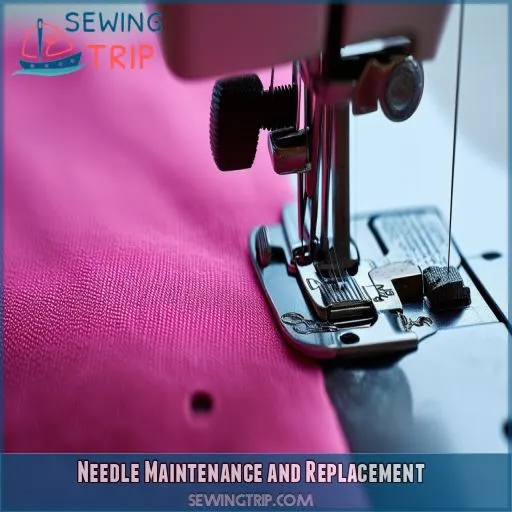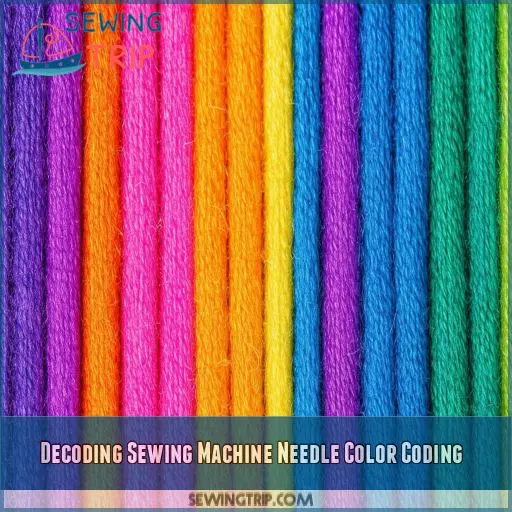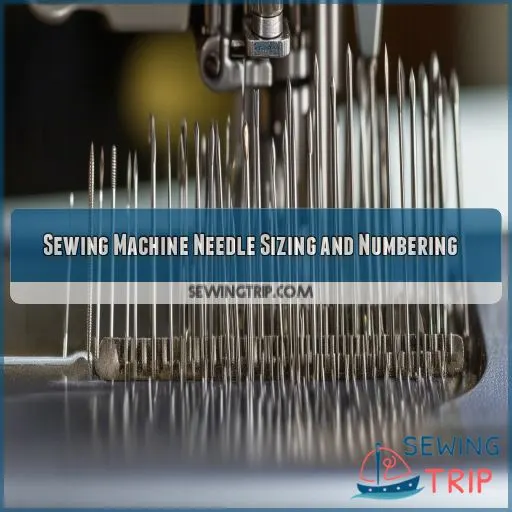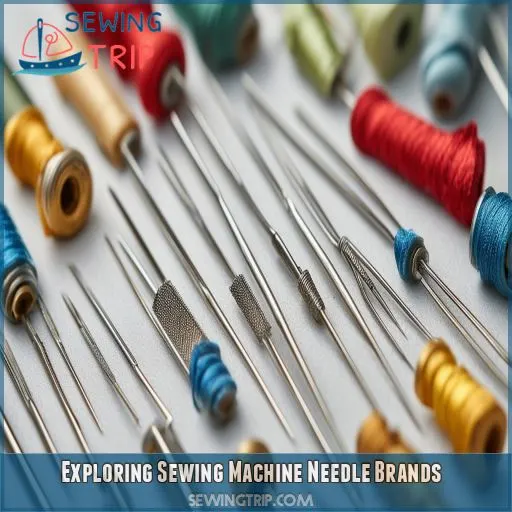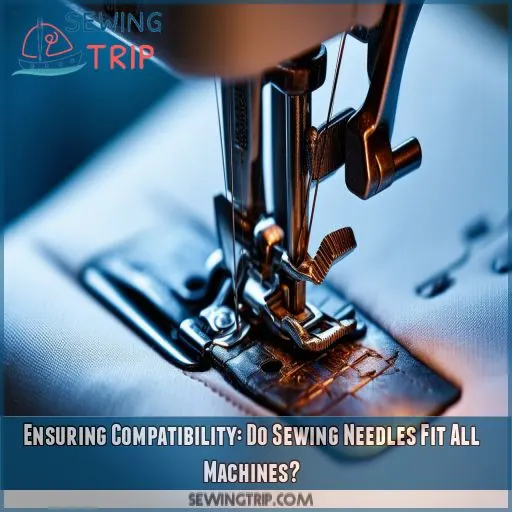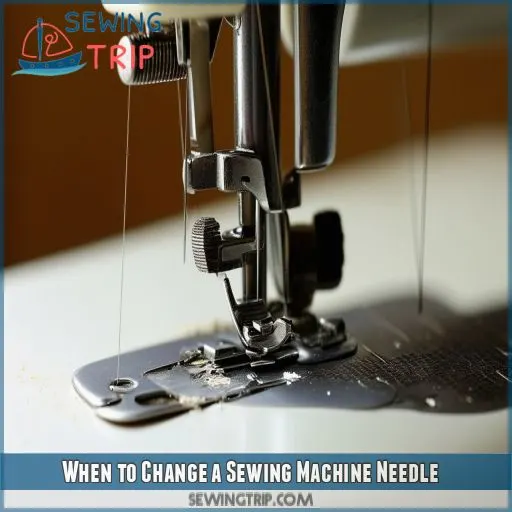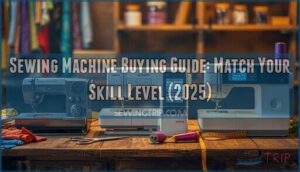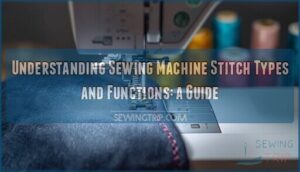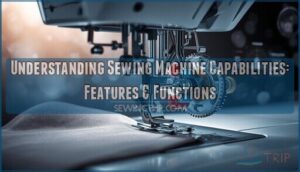This site is supported by our readers. We may earn a commission, at no cost to you, if you purchase through links.
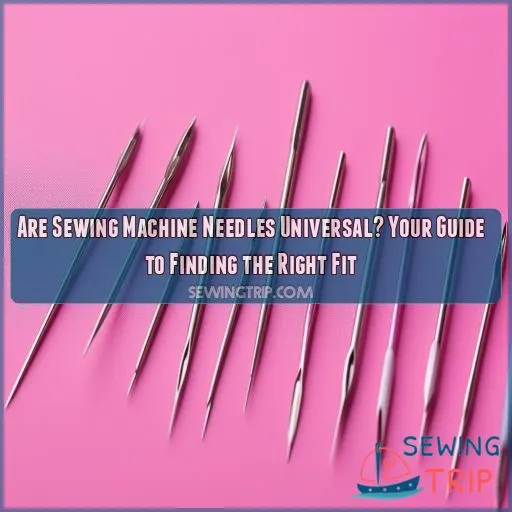
You’ll need to select the correct needle for your project to achieve the best possible results.
In this guide, you’ll learn how to choose the perfect needle based on your fabric, thread, and machine type.
We’ll explore needle sizes, types, and compatibility, empowering you to make knowledgeable decisions.
By mastering needle selection, you’ll enhance your sewing skills, prevent damage to your materials and machine, and achieve professional-quality results.
Let’s unravel the mystery of sewing machine needles together.
Table Of Contents
- Key Takeaways
- Are Sewing Machine Needles Universal and Interchangeable?
- Understanding Sewing Machine Needle Sizes
- Selecting the Right Needle for Your Fabric
- Exploring the Different Types of Sewing Machine Needles
- Needle Maintenance and Replacement
- Decoding Sewing Machine Needle Color Coding
- Sewing Machine Needle Sizing and Numbering
- Exploring Sewing Machine Needle Brands
- Ensuring Compatibility: Do Sewing Needles Fit All Machines?
- When to Change a Sewing Machine Needle
- Frequently Asked Questions (FAQs)
- Conclusion
Key Takeaways
- While not all sewing machine needles are one-size-fits-all, most domestic machines use standard needles. It’s like finding the right dance partner – compatibility is key, but you’ve got plenty of options!
- Needle selection is a bit of an art form. Consider fabric weight, thread type, and your project’s needs. It’s like being a matchmaker for your sewing machine and fabric – find the perfect pair and watch the magic happen!
- Don’t be a needle hoarder! Change your needle every 8-10 hours of sewing or when switching fabrics. A fresh needle is like a breath of fresh air for your sewing machine – it’ll keep things running smoother than butter on a hot skillet.
- Decoding needle types is easier than cracking the Da Vinci Code. Universal, ballpoint, sharp, and specialty needles each have their time to shine. It’s like having the right tool for every job – your sewing projects will thank you!
Are Sewing Machine Needles Universal and Interchangeable?
When you’re starting your sewing journey, you’ll quickly realize that not all sewing machine needles are created equal.
While many needles share common features, they’re not universally interchangeable.
The key lies in understanding the nuances of needle materials, sharpness, head shapes, and eye sizes.
Different fabrics and projects require specific needle types to achieve the best results.
universal needles are versatile workhorses, but they won’t excel in every situation.
Needle point variations, such as sharp or ballpoint, cater to different fabric weaves.
Brands like Schmetz, Singer, and Janome offer a range of options, each with its own strengths.
To make sure your sewing machine runs smoothly, you’ll need to match the needle to your project’s requirements.
Don’t worry, though – with a bit of knowledge, you’ll soon be a needle-selecting pro!
Understanding Sewing Machine Needle Sizes
- American sizes range from 8 to 19, with larger numbers indicating thicker needles
- European sizes range from 60 to 120, following the same principle
- A size 80 European needle is equivalent to a size 12 American needle
Needle thickness affects durability, sharpness, and the size of the eye. Thicker needles are more robust but leave larger holes, while thinner ones are perfect for delicate fabrics. The needle material also plays a role in its performance. Remember, choosing the right size is instrumental for achieving those picture-perfect stitches you’ve been dreaming of!
Selecting the Right Needle for Your Fabric
When selecting the right needle for your fabric, you’ll need to take into account both the fabric weight and the thread you’re using. Choose a thicker needle for heavier fabrics and thicker threads, while opting for a finer needle when working with delicate materials and lightweight threads.
Considering Fabric Weight
When selecting a sewing machine needle, fabric weight is paramount.
Heavier fabrics necessitate larger needle diameters, while delicate materials warrant finer needles.
Align the needle size with your fabric’s strength to guarantee integrity.
For example, employ a stretch needle for knits, a leather needle for resilient hides, or a denim needle for thick jeans.
Recall, the appropriate needle guarantees seamless stitching and safeguards your fabric from undue wear.
Considering Thread Weight and Type
Just as fabric weight matters, thread weight and type play a vital role in needle selection.
You’ll want to match your needle’s eye size to the thread diameter for smooth stitching.
Consider friction control and abrasion resistance when pairing threads with needles.
Different thread weights and types may require specialty needles to guarantee compatibility and satisfactory performance.
Don’t forget to explore various needle types for your specific sewing needs.
Exploring the Different Types of Sewing Machine Needles
Sewing machine needles come in various types to suit different fabrics and projects. You’ll find universal needles for general use, ballpoint needles for knits, sharp needles for woven fabrics, and specialty needles for specific tasks like topstitching or working with denim.
Universal Needles
Now that you’ve learned about selecting the right needle for your fabric, let’s explore universal needles. These versatile workhorses are designed to handle a wide range of fabrics. Here’s why they’re a go-to choice:
- Perfect for beginners mastering their craft
- Adaptable to various sewing projects
- Cost-effective for multi-fabric use
- Ideal for quick fabric switches
- Reliable performance across different materials
Universal needles offer a balance of sharpness and durability, making them suitable for most everyday sewing tasks. They’re numbered based on size, with higher numbers indicating thicker needles.
Ballpoint Needles
While universal needles are versatile, ballpoint needles are your go-to for knit fabrics and stretchy materials.
Their rounded tip slips between fabric fibers instead of piercing them, preventing snags and runs.
For fine or delicate fabrics, these needles are a lifesaver.
They’re like gentle giants in the sewing world, handling your most challenging materials with finesse.
Don’t let knits intimidate you – ballpoint needles have got your back!
Sharp Needles
Sharp needles are your go-to for precision work on tightly woven fabrics.
With their fine, tapered points, they effortlessly penetrate dense materials without leaving visible holes.
You’ll find various needle point styles and tip shapes designed for specific tasks.
These needles’ durability and material composition guarantee they maintain their sharpness, making them ideal for intricate stitching.
Specialty Needles
When you’re tackling unique projects, specialty needles are your secret weapon.
For narrow hems and topstitching, there’s a needle designed to excel.
Machine embroidery? There’s a needle for that too.
Even metallic threads have their perfect match.
Don’t forget about double-eye, quick-threading, and self-threading needles – they’re game-changers for specific tasks.
Crafted from various materials, these specialized needles guarantee you’re equipped for any sewing challenge that comes your way.
Needle Maintenance and Replacement
Now that you’ve explored different needle types, let’s talk about keeping them in top shape. Your sewing machine’s needle life is essential for smooth stitching. Don’t wait for broken machines or bent shanks to replace them! Change your needle after 8-10 hours of sewing or when switching fabrics. A dull needle can damage your projects and even your machine.
To check if your needle needs replacing, run your fingertip along its length. Feel any snags? It’s time for a new one. Also, inspect the eye for damage – a worn eye can fray your thread. Remember, sharpened needles aren’t just for show; they’re fundamental for clean stitches.
While sewing machine needles aren’t universal, many brands offer compatible options. Schmetz, Singer, and Janome are popular choices. By maintaining your needles, you’ll keep your sewing projects running smoothly and your machine purring like a well-oiled kitten.
Decoding Sewing Machine Needle Color Coding
Decoding sewing machine needle color coding can feel like cracking a secret code, but it’s actually a handy system designed to make your life easier. Manufacturers use color bands to help you quickly identify needle size and type. The upper band typically indicates the needle type, while the lower band represents its size. Schmetz, an industry leader, introduced this color-coding system, which has since become a standard across many brands.
Here’s a quick visual guide to help you remember:
- Picture a vibrant orange band, signaling a versatile 80/12 needle
- Imagine a cool blue band, indicating a robust 90/14 needle
- Envision a sleek red band, representing a delicate 70/10 needle
Sewing Machine Needle Sizing and Numbering
Understanding sewing machine needle sizing can be a bit like decoding a secret language. You’ll encounter two main systems: American and European. The American system uses numbers, while the European system uses millimeters. Don’t worry, though – we’ve got you provided with this handy conversion table:
| American Size | European Size | Fabric Weight | Thread Weight |
|---|---|---|---|
| 9 | 65 | Very Light | Very Fine |
| 11 | 75 | Light | Fine |
| 14 | 90 | Medium | Medium |
| 16 | 100 | Heavy | Heavy |
Exploring Sewing Machine Needle Brands
Regarding sewing machine needles, you have options. Several brands dominate the market, each providing unique features and advantages. Here’s a quick overview of the top contenders:
- Schmetz: Known for their exceptional needle quality and durability
- Singer: A household name with a wide range of compatible needles
- Janome: Offers innovative needles designed for specific fabrics and techniques
These brands prioritize needle compatibility, ensuring you’ll find the right fit for your machine. While Schmetz leads in global production, Singer and Janome aren’t far behind in terms of availability. You’ll notice differences in needle pricing, but remember, investing in quality pays off in the long run. Don’t be afraid to experiment with different brands to find your perfect match. After all, the right needle can make or break your sewing project. So, why settle for less when you can stitch with the best?
Ensuring Compatibility: Do Sewing Needles Fit All Machines?
While we’ve explored various needle brands, you might wonder if they’re all compatible with your machine. The good news is that needle standardization has made life easier for sewists. Most domestic sewing machines use the same needle system, typically the 130/705H or HAx1. This means you can generally use needles from different brands without worry.
However, it’s not a one-size-fits-all scenario. Some industrial or specialized machines may require specific needle types. To verify machine compatibility, always check your manual or consult with your machine’s manufacturer. The great thing about needle availability is that you can usually find compatible options at your local craft store or online.
When to Change a Sewing Machine Needle
You’ll need to change your sewing machine needle more often than you might think. A durable needle doesn’t last forever, and using a worn-out one can lead to frustrating issues. Keep an eye out for signs like skipped stitches, fabric damage, or unusual noises from your machine. These are telltale indicators that it’s time for a fresh needle.
Don’t wait for problems to arise, though. As a rule of thumb, swap out your needle after every 8-10 hours of sewing or when you switch to a different fabric type. If you’ve been working on a heavy project, change it even sooner. Always check for a bent needle by laying it flat on a surface – if it’s not perfectly straight, it’s time to retire it.
Frequently Asked Questions (FAQs)
Do sewing needles fit all machines?
Most sewing machines use standard needles, but there are exceptions. You’ll need to check your machine’s manual to confirm compatibility. While many needles are interchangeable, it’s best to use the recommended type for ideal performance and safety.
Are sewing machine needles interchangeable between brands?
Threading the needle of compatibility, you’ll find most sewing machine needles are interchangeable between brands. However, it’s wise to check your machine’s manual. Some high-end or specialized machines may require specific needles for ideal performance and safety.
Do all sewing machines use the same needle?
No, not all sewing machines use the same needle. You’ll need to match the needle type to your machine’s specifications. While many are interchangeable, it’s important to check your machine’s manual for compatibility to guarantee good performance.
How do I know what sewing machine needle to use?
You’ll crack the needle code by matching fabric weight and type. Check your project’s needs, then select the right size and type. Universal needles work for most tasks, but specialty needles can elevate your sewing game.
Can I use hand sewing needles in my machine?
No, you can’t use hand sewing needles in your machine. They’re designed differently and won’t fit properly. Stick to machine-specific needles for your sewing machine to avoid damage and guarantee smooth operation. Don’t risk it!
How do needle coatings affect sewing performance?
needle coatings enhance your sewing performance. They’ll reduce friction, heat, and wear, helping your thread glide smoothly. You’ll notice improved stitch quality and less fabric damage. Titanium and chrome coatings are popular choices for durability and longevity.
Are there eco-friendly or biodegradable sewing machine needles?
You won’t find truly eco-friendly sewing machine needles yet. While some manufacturers are exploring sustainable options, current needles aren’t biodegradable. Your best bet is to recycle old needles and use high-quality ones that last longer.
Can I sharpen dull sewing machine needles?
You shouldn’t sharpen dull sewing machine needles. It’s not effective and can damage your machine or fabric. Instead, replace them regularly. Dull needles can cause skipped stitches, fabric snags, and uneven seams. Invest in fresh needles for ideal results.
Do vintage machines require special needle types?
You’ll often need specific needles for vintage machines. While some modern needles might fit, it’s best to check your machine’s manual or consult an expert. Older models often require unique needle types for optimal performance.
Conclusion
Like a key to a lock, selecting the appropriate sewing machine needle is fundamental for your project’s success.
While sewing machine needles aren’t universally interchangeable, you’re now equipped to choose the optimal needle for your fabric, thread, and machine.
Remember to evaluate needle size, type, and compatibility when making your choice.
By applying this knowledge, you’ll enhance your sewing skills, protect your materials and machine, and achieve professional results.
Keep this guide handy, and you’ll never wonder "are sewing machine needles universal?" again.

